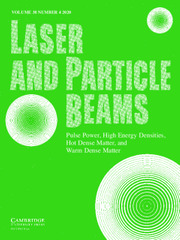Crossref Citations
This article has been cited by the following publications. This list is generated based on data provided by
Crossref.
Charakhch'yan, Alexander A.
and
Khishchenko, Konstantin V.
2015.
Plane thermonuclear detonation waves initiated by proton beams and quasi-one-dimensional model of fast ignition.
Laser and Particle Beams,
Vol. 33,
Issue. 1,
p.
65.
Khishchenko, K. V.
and
Charakhch’yan, A. A.
2015.
On some features of plane waves of thermonuclear burn.
Journal of Applied Mechanics and Technical Physics,
Vol. 56,
Issue. 1,
p.
86.
Medin, S.A.
Basko, M.M.
Orlov, Yu N.
and
Suslin, V.M.
2016.
Simulation of microexplosion hydrodynamics in heavy ion fusion reactor chamber with wetted first wall.
Fusion Engineering and Design,
Vol. 112,
Issue. ,
p.
388.
Wu, Fuyuan
Ramis, Rafael
and
Li, Zhenghong
2018.
A conservative MHD scheme on unstructured Lagrangian grids for Z-pinch hydrodynamic simulations.
Journal of Computational Physics,
Vol. 357,
Issue. ,
p.
206.
Frolova, A. A.
Khishchenko, K. V.
and
Charakhch’yan, A. A.
2019.
Fast Ignition by a Proton Beam and Burning of a DT Cylindrical Shell Target.
Plasma Physics Reports,
Vol. 45,
Issue. 9,
p.
830.
Rezaie-Chamani, Afsaneh
Ghasemizad, Abbas
and
Khoshbinfar, Soheil
2019.
Ignition threshold in cylindrical fast ignition targets.
Physics of Plasmas,
Vol. 26,
Issue. 4,
Ghorbanpour, E.
Ghasemizad, A.
and
Khoshbinfar, S.
2019.
Non-equilibrium ignition criterion for magnetized deuterium–tritium fuel.
Nuclear Science and Techniques,
Vol. 30,
Issue. 4,
Charakhch’yan, A A
Frolova, A A
and
Khishchenko, K V
2019.
The role of heat loss at the fuel–shell interface during the fast ignition of cylindrical DT targets.
Journal of Physics: Conference Series,
Vol. 1147,
Issue. ,
p.
012089.
Khishchenko, K. V.
and
Charakhch’yan, A. A.
2021.
Reflection of Detonation Wave from the Symmetry Plane within a Cylindrical Target for Controlled Thermonuclear Fusion.
Computational Mathematics and Mathematical Physics,
Vol. 61,
Issue. 10,
p.
1682.
Yang, Meng-Qi
Wu, Fu-Yuan
Chen, Zhi-Bo
Zhang, Yi-Xiang
Chen, Yi
Zhang, Jin-Chuan
Chen, Zhi-Zhen
Fang, Zhi-Fan
Rafael, Ramis
and
Zhang, Jie
2022.
Two-dimensional radiation hydrodynamic simulations of high-speed head-on collisions between high-density plasma jets.
Acta Physica Sinica,
Vol. 71,
Issue. 22,
p.
225202.
Khishchenko, K. V.
and
Charakhch’yan, A. A.
2023.
Numerical Study of Instability of Medium Interface During Thermonuclear Combustion of a Cylindrical Shelled Microtarget.
Computational Mathematics and Mathematical Physics,
Vol. 63,
Issue. 4,
p.
644.
Khishchenko, K. V.
and
Charakhch’yan, A. A.
2023.
Numerical Study of Instability of Medium Interface During Thermonuclear Combustion of a Cylindrical Shelled Microtarget.
Журнал вычислительной математики и математической физики,
Vol. 63,
Issue. 4,
p.
678.
Lei, Y. Y.
Wu, F. Y.
Ramis, R.
and
Zhang, J.
2024.
Comparison of the evolution of Rayleigh–Taylor instability during the coasting phase of the central ignition and the double-cone ignition schemes.
Physics of Plasmas,
Vol. 31,
Issue. 1,
Du, Qianlei
Wu, Fuyuan
and
Zhang, Jie
2025.
Comprehensive comparisons of different fusion fuels by transfer learning.
Physics of Plasmas,
Vol. 32,
Issue. 2,


